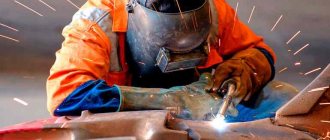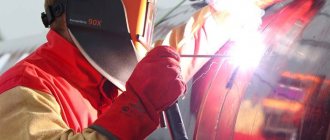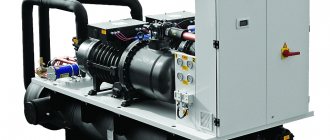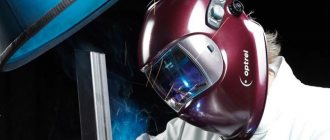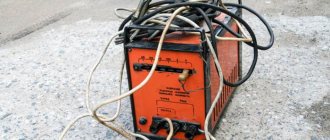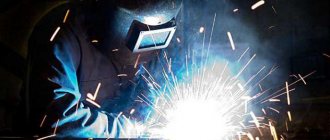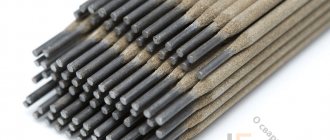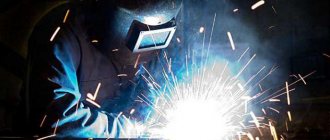Photo source Kateryna Babaieva/pexels
Blue-collar professions today are among the most in demand among employers and at the same time the most unpopular among potential applicants. This group also includes the profession of welder.
Welder - who is this?
Photo source: Pavel Chernonogov/pexels
A welder is a worker who
is engaged in fastening metal products
without the use of fastening devices. The duration of use of the equipment and the strength of the created products depend on the quality of the welder’s work.
This specialist is in demand in a variety of areas: from utilities to metallurgy.
Due to the fact that the range of activities is very wide, there are quite a lot of professional and personal requirements for representatives of this profession.
Medical restrictions
There are almost no contraindications to becoming a welder. But if a person has hearing, vision, musculoskeletal disorders, or some mental abnormalities that may prevent him from working with equipment, unfortunately, the path to the profession will be closed.
Also, welding is usually not taught to people with hypertension, respiratory diseases (even bronchitis), as well as claustrophobia and acrophobia. Welding work can be carried out in different conditions, so fear of confined spaces or heights can interfere with concentration, and therefore the completion of the task.
Since not only men, but also women can be welders, their medical contraindications are even stricter.
What does a welder do?
Using a welding machine, it heats parts of the product in
, causing the metal to bond at the interatomic level. To perform this kind of work, special welding machines are used.
A specialist can perform various types of welding work. There are currently three recognized and used welding classes:
- Thermal class
. A worker performs welding using heat.
- Thermomechanical class
. Parts are welded by heating and applying pressure.
- Mechanical class
. A welded joint is obtained using only mechanical energy.
When did it appear
Humanity mastered the first welding skills back in the 9th-10th centuries. BC. After forging, pieces of semi-precious and precious metals were placed in a special mold. After heating, the molten mass was poured onto the joints. This process is called foundry welding. Weapons and tools were made through furnace processing. To do this, iron blanks were heated in a forge with further forging of the joints.
Significant advances in electricity and physics occurred in the 18th and 19th centuries. After the invention of the voltaic column, the domestic scientist V.V. Petrov. discovered an electric arc formed between a pair of carbon electrodes. This phenomenon formed the basis of electric welding, since temperatures of about 5,000 °C can melt any metal.
In 1881 Benardos N.N. gave a description of welding with a carbon electrode. Subsequently, tungsten analogues, oxygen gas cutters, and burners appeared. With the development of technology, the specialty of a welder was divided into several categories with an assessment of the worker’s skill according to qualification classes.
What qualities should a welder have?
The specificity of this type of occupation is such that the welder needs to be aware not only of the concept of the operation of professional equipment, safety measures during operation of the welding machine, but also know physics and chemistry at least at the level of school knowledge.
The most important personal characteristics of a welder include accuracy, precision, diligence, and hard work.
.
At the same time, one should not overlook the fact that the welder works in heavy production, so he needs to carefully monitor his health. For example, it is necessary to regularly check your vision, cardiovascular system, and respiratory organs.
And according to the safety precautions of any heavy production, people with unstable mental health, osteochondrosis, radiculitis and allergies are strictly not allowed to work with a welding machine. Those who have problems with vision, heart and lungs may also be denied employment.
Let's sum it up
We tried to sanctify the professional activity as much as possible, and you found out who the gas welder is. Now you know what its benefits are and what a specialist does. This article is like a guide for children in choosing a future specialty, thanks to which the child will be able to learn about the pros and cons of what they will have to face, after which they can make an informed decision.
And here we must not miss the point that the specialty of a gas welder is the future, because in our country there is still so much unexplored. New gas fields are being discovered, factories and entertainment complexes are being built, where it is impossible to do without the “golden hands” of qualified gas welders.
You may be interested in the article: Who is a gas worker, features of the profession, what does he do?
Where can I get training to become a welder?
You can become a certified specialist after the 9th or 11th grade of school.
Training to become a welder is carried out in almost all vocational schools and colleges in the country. Also, those who want to master this profession can enter a higher educational institution. Studying at a university provides the student with the opportunity to later begin a career as a personnel manager or start their own business. At the same time, in all educational institutions there is an annual shortage of budget places in this area, which indicates a clear shortage of qualified workers.
Also, a future welder can undergo training through courses
. In a short period of time, which in most cases does not exceed three months, you can master a profession and become a specialist in this field. Some organizations offer to become a specialist remotely in an even shorter period of time.
The final stage of the training is obtaining a welder’s certificate of the established type, which allows you to perform welding work. But in order to perform complex welding work on large projects, obtaining NAKS certification is required.
NAKS is the National Welding Control Agency
. An employee who has received a document from this organization is considered the most qualified specialist in this field.
Photo source: Thang Cao/pexels
Profession categories
Since a welder is a multidisciplinary specialty that involves solving diverse problems depending on the characteristics of the organization, it is customary to distinguish six categories of this profession:
- Welder-press operator
works on machines that connect parts under the influence of a special press and high temperature.
- Welder of diffusion welding installations
It works with special honeycomb ovens.
- Electron beam welder
- This is someone who works with compact, small products, as well as with metals that have heating limitations.
- Thermal welder
uses a special powder mixture of aluminum and oxides of various metals. This mixture is commonly called thermite.
- Gas welder
performs welding of products using gas.
- Electric and gas welder
works using electric arc or gas welding.
Fire prevention measures
A by-product of the welding process, molten metal spatter, can cause a fire . According to the requirements of fire safety standards, the production site must have fire extinguishing equipment:
- fire extinguisher;
- buckets;
- shovels;
- sand.
Technical gases pose a high risk.
Acetylene, propane, hydrogen require special attention. Acetylene can ignite from the slightest spark, so generators for the synthesis of this gas are placed at a considerable distance from the work site. Propane leaks can also cause a fire. Hydrogen, when in contact with oxygen, forms an explosive mixture, since the process of water formation is accompanied by the release of a large amount of energy, which poses a great danger in the open air.
Semi-automatic welding is considered the safest joining method. The melt zone is protected by an inert gas, and the formation of a seam is accompanied by a minimal amount of splashes of molten metal.
Welding categories
The degree of qualification and professionalism of a welder can be understood by knowing his rank.
There are six in total:
- 1st category
– work with plastic products: dismantling, assembling components for welding, simple welding work.
- 2nd category
– thermite (plasma and arc) welding.
- 3rd category
– performing all basic types of welding.
- 4th category
– manual, arc, plasma welding, oxygen cutting of more complex parts.
- 5th category
– welding of parts and assemblies of a high level of complexity, vacuum connections. Welding under the influence of electron beams or under pressure.
- 6th category
– performing work of any type and complexity, a wide range of work.
Regardless of what qualification level a welder has, he must perform the following duties:
- Accurate planning of the scope of work and its timing.
- Compliance with labor safety standards.
- Improving your professional qualities.
- Carrying out an analysis of the quality of welding work performed, etc.
Difficulties of the work
The specifics of welding depend on the properties of the base metal and the spatial location of the seam . Materials have different thermal conductivity, which leaves its mark on the process of their connection. Violations of technology can lead to the following defects:
- cracks;
- chips;
- surges;
- cavities;
- burns;
- undercuts.
When working with load-bearing metal structures of critical construction projects, the above disadvantages are the reason for mechanical removal of the seam and requirements for re-joining. Some defects are identified by visual inspection of the solidified metal; for others, non-destructive testing methods are used that examine the internal structure of the welded area.
The responsibilities of the welder include the process of studying the structure of the seam upon completion of the work and eliminating all identified deficiencies.
What does being a welder require?
The most important responsibility of representatives of this profession is quality work.
Another equally significant responsibility is compliance with safety regulations and labor standards in hazardous production. The rest of the functionality depends on what company the welder works at and what category he has. Therefore, the list of employee responsibilities can also include: tracking the deadline for completing work, ordering the necessary materials or equipment, maintaining reporting documentation.
One of the distinctive features of workers in this profession is a welding mask.
, which allows you to more accurately connect parts. When welding, a lot of heat and light energy is released; without eye protection from bright light, vision loss is inevitable, so a worker in this profession must be sure to monitor the condition of his mask.
How much does a welder earn in Russia?
Current realities are such that there is an acute shortage of skilled workers in the labor market
.
For this reason, the average salary of welders in Russia is quite high. According to employee search services, a technical school graduate with a first grade and little experience can easily find a job for 20,000 rubles
a month in the housing and communal services sector.
A highly qualified professional can count on a salary of 30,000 rubles
.
At the same time, the housing and communal services sector has the lowest salary level, and, for example, in the oil and gas industry, a qualified welder can earn about 90,000 rubles
.
The highest salary indicated on online job search services is more than 150 thousand rubles for professional welders with extensive work experience
.
Another factor influencing the level of a welder’s salary is additional payments and compensation for hazardous work. According to the Labor Code of the Russian Federation, it must be at least 4% of wages. At the same time, the employer, assessing the complexity and working conditions, can increase this percentage.
Disadvantages and advantages of the welder profession
The general unpopularity of the profession is associated with difficult working conditions
. The welder works at any time of the year; shift work is also practiced. For example, the construction of any oil and gas production complex cannot be completed without welders. Therefore, highly qualified personnel are sent to undeveloped territories to create residential and non-residential structures. Another difficulty of the profession is working at heights. All these factors often outweigh the desire to earn money, which is why the demand for specialists is consistently high.
The welding machine, even with the use of protective equipment, negatively affects vision. At the production site, welders regularly inhale toxic fumes, which lead to respiratory diseases. And constant physical activity leads to problems with the heart and joints.
Thus, a high level of income, prestige, the opportunity for self-development and career growth lose their attractiveness in the eyes of job seekers.
